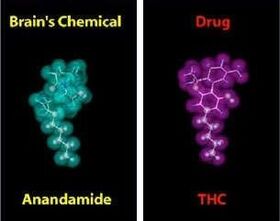 Courtesy of National Institute on Drug Abuse. Courtesy of National Institute on Drug Abuse. Marijuana is a psychoactive substance that's classified as a hallucinogen. Most users of the drug would describe it as a depressant because it induces a state of calm or relaxation. The drug's pretty sneaky though and can have serious implications that are so subtle the user often doesn't connect their use of the drug to its consequences. Initially a person's anxiety may be the motivator for marijuana use but over time the person may notice an increase in anxiety and there's a reason why. Studies show that marijuana in small doses can reduce anxiety but can increase anxiety in larger doses. And the addictive qualities of marijuana turn it into a regular habit where people are smoking larger quantities more frequently, which builds up in the body and boom! - you guessed it - more anxiety. Marijuana is also highly addictive because it triggers the brain's reward system, which also leads to withdrawal. In addition to the reward system, marijuana impacts the endocannabinoid system, which is expressed in all brain regions that are important for processing anxiety, fear, and stress. It's a big player in our nervous system and also regulates biological functions such as eating, learning and memory, reproduction, metabolism, etc. It's what's responsible for giving people the "munchies." The THC molecule is able to attach to the anandamide receptor (see pic). This decreases the endocannabinoid system's tone (think: muscle tone but for the brain) and further adds to marijuana's addictive properties. If the brain doesn't need to create anandamide molecules because a person is replacing it with THC, then the brain loses that tone. This is why a lot of heavy marijuana users aren't hungry unless they're smoking. Because both of these systems are impacted by marijuana you can run into a number of psychological and behavioral issues that may seem like they're not related. Misinformation is a big issue and obstacle in addiction treatment with this drug. Think of every marijuana smoker who's sworn on their life that marijuana is not addictive. The impact on memory, motivation and alertness are all well known but my big concern is the impact it has on a person's mental health. Anxiety isn't the only manifestation of an out of whack endocannabinoid system. People can also feel paranoid and suicidal. Add some denial that marijuana is addictive and/or problematic to the mix and you have someone walking around wondering why they're so depressed and paranoid. Maybe you've had a moment of clarity around your relationship with marijuana or there's someone you care about in your life who's use is out of hand. My suggestion to the former, take a month off and see if your symptoms improve. Another avenue is to examine how marijuana has impacted the following five areas of your life:
Marijuana has very legitimate uses in appropriate doses for medicinal use but when it comes to recreational use, it's a drug like any other drug with addictive qualities and consequences to match. More information can be found here:
Driving under the influence of marjiuana: https://www.nstlaw.com/guides/driving-under-the-influence-of-marijuana/ General information about marijuana: https://nida.nih.gov/publications/research-reports/marijuana/what-marijuana
0 Comments
Your comment will be posted after it is approved.
Leave a Reply. |